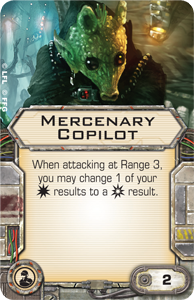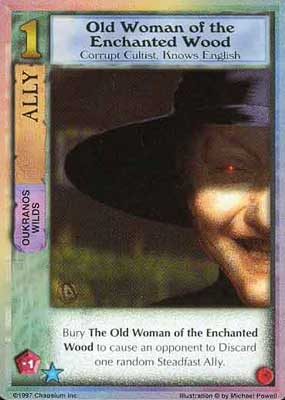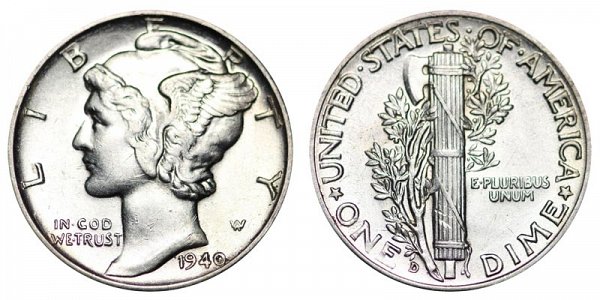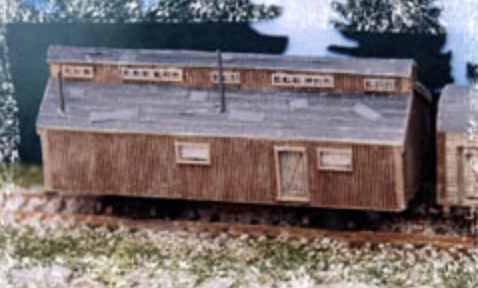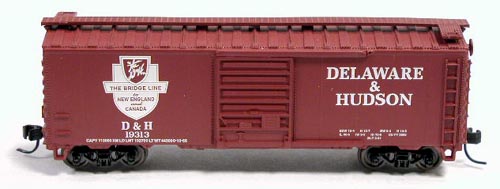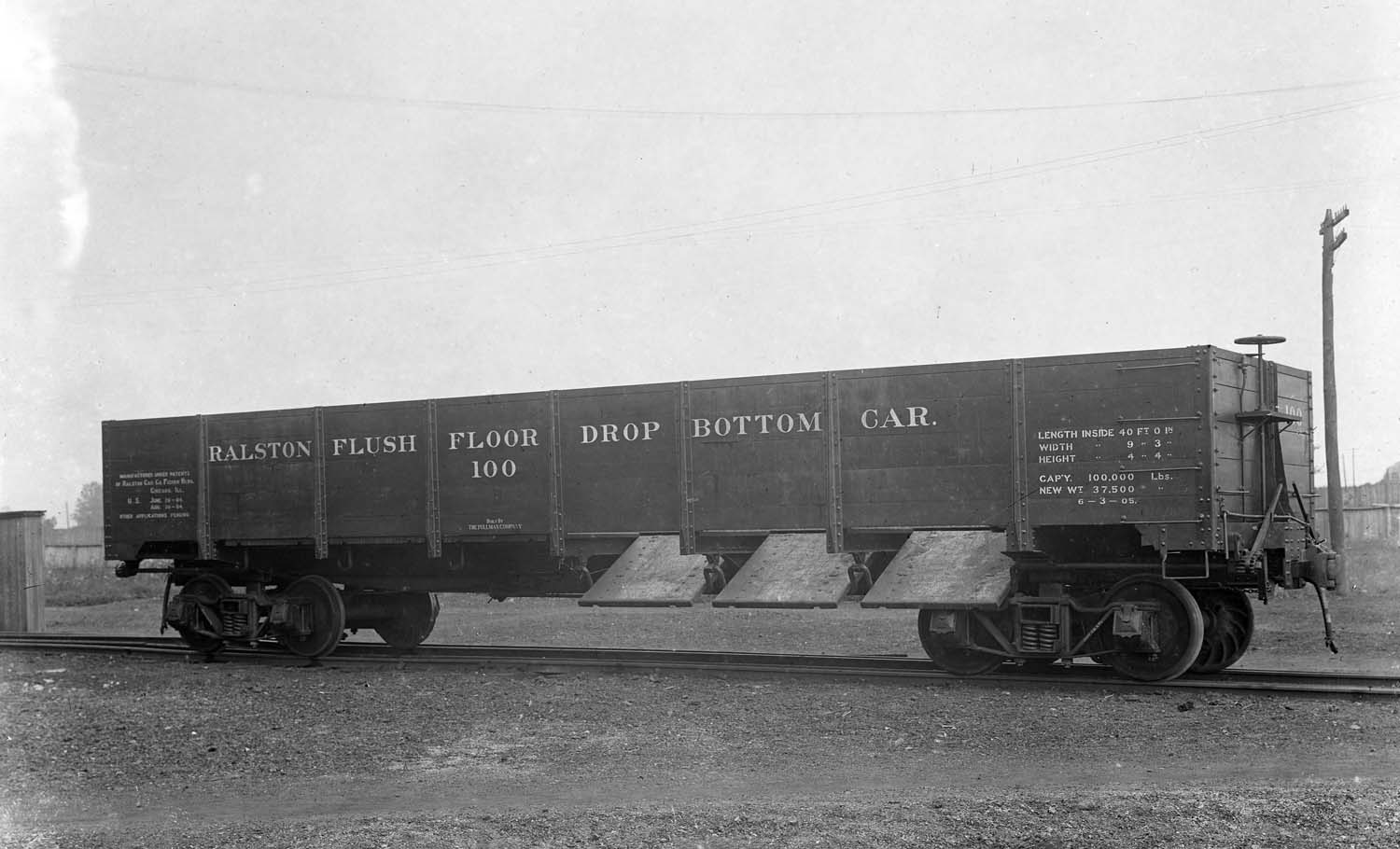Model Information: This model from Trainworx was first introduced in September of 2008. It has some great features such as separately applied ladders, grab irons and brake platform detail. The underframe is exceptionally detailed as is the interior. So much effort was spent on the interior it seems a shame to add a load! These models use Micro-Trains Bettendorf trucks with integrated couplers. It would be nice to see body-mount couplers, but this model seemed to have come out just before body-mount couplers became the norm. Also, the couplers come with standard MTL supplied injection molded wheels, whereas newer high-end models come with metal wheels. These last two comments are not meant as criticisms, but rather serve to illustrate trends in N Scale rolling stock manufacturing.
Prototype History: In US railroad terminology, a gondola is an open-topped rail vehicle used for transporting loose bulk materials. All-steel gondolas date back to the early part of the 20th century. Because of their low side walls gondolas are also suitable for the carriage of such high-density cargoes as steel plates or coils, or of bulky items such as prefabricated sections of rail track.
Drop-bottom gondolas were equipped with dump doors that operated via a mechanism located in the center of the car body. The drop bottom door provided a time-saving unloading method compared to the usual, labor-intensive procedure. Instead of equipping workmen with shovels to muck out the car’s content, the lever system was used to open the doors thus immediately dumping the load on the ground. Various commodities could be carried in the drop bottom gons, but coal loadings were most common. Many coaling towers had elevated trestle style delivery ramps where the drop bottom gondolas would be spotted and workmen could simply open the dump doors to spill the contents into the coal bins. At facilities with the elevator bucket style of coal dock, a ramp was used that led up to an open grate where the coal would spill through and into the lower coal bins. The gons were “tailor made” for company service such as dumping ballast directly onto track roadbed during maintenance, as well as hauling cinders out of various engine service facilities. Handy they were!
Drop-bottom gondolas were equipped with dump doors that operated via a mechanism located in the center of the car body. The drop bottom door provided a time-saving unloading method compared to the usual, labor-intensive procedure. Instead of equipping workmen with shovels to muck out the car’s content, the lever system was used to open the doors thus immediately dumping the load on the ground. Various commodities could be carried in the drop bottom gons, but coal loadings were most common. Many coaling towers had elevated trestle style delivery ramps where the drop bottom gondolas would be spotted and workmen could simply open the dump doors to spill the contents into the coal bins. At facilities with the elevator bucket style of coal dock, a ramp was used that led up to an open grate where the coal would spill through and into the lower coal bins. The gons were “tailor made” for company service such as dumping ballast directly onto track roadbed during maintenance, as well as hauling cinders out of various engine service facilities. Handy they were!
Road Name History: 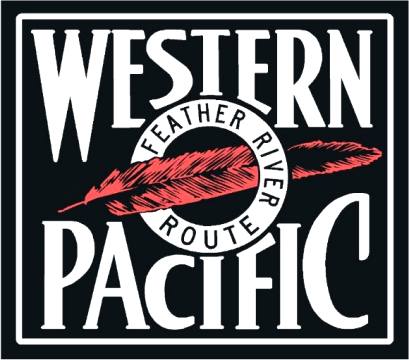 The Western Pacific Railroad (reporting mark WP) was a Class I railroad in the United States. It was formed in 1903 as an attempt to break the near-monopoly the Southern Pacific Railroad had on rail service into northern California. WP's Feather River Route directly competed with SP's portion of the Overland Route for rail traffic between Salt Lake City/Ogden, Utah and Oakland, California for nearly 80 years. In 1983 the Western Pacific was acquired by the Union Pacific Railroad. The Western Pacific was one of the original operators of the California Zephyr.
The Western Pacific Railroad (reporting mark WP) was a Class I railroad in the United States. It was formed in 1903 as an attempt to break the near-monopoly the Southern Pacific Railroad had on rail service into northern California. WP's Feather River Route directly competed with SP's portion of the Overland Route for rail traffic between Salt Lake City/Ogden, Utah and Oakland, California for nearly 80 years. In 1983 the Western Pacific was acquired by the Union Pacific Railroad. The Western Pacific was one of the original operators of the California Zephyr.
The original Western Pacific Railroad was established in 1865 to build the westernmost portion of the Transcontinental Railroad between San Jose, California (later Oakland, California), and Sacramento, California. This company was absorbed into the Central Pacific Railroad in 1870.
The second company to use the name Western Pacific Railroad was founded in 1903. Under the direction of George Jay Gould I, the Western Pacific was founded to provide a standard gauge track connection to the Pacific Coast for his aspiring Gould transcontinental system. The construction was financed by the Denver and Rio Grande Western Railroad, a company in the Gould system, which lost access to California due to the attempted acquisition of the Southern Pacific Railroad by the Rio Grande's main rival, the Union Pacific Railroad. The Western Pacific Railroad acquired the Alameda and San Joaquin Railroad and began construction on what would become the Feather River Route. In 1909 it became the last major railroad completed into California. It used 85-lb rail on untreated ties, with no tie plates except on curves over one degree; in 1935 more than half of the main line still had its original rail, most of it having carried 150 million gross tons.
The Western Pacific was acquired in 1983 by Union Pacific Corporation, which in 1996 would purchase its long-time rival, the Southern Pacific Railroad. In July 2005 Union Pacific unveiled a brand new EMD SD70ACe locomotive, Union Pacific 1983, painted as an homage to the Western Pacific.

The original Western Pacific Railroad was established in 1865 to build the westernmost portion of the Transcontinental Railroad between San Jose, California (later Oakland, California), and Sacramento, California. This company was absorbed into the Central Pacific Railroad in 1870.
The second company to use the name Western Pacific Railroad was founded in 1903. Under the direction of George Jay Gould I, the Western Pacific was founded to provide a standard gauge track connection to the Pacific Coast for his aspiring Gould transcontinental system. The construction was financed by the Denver and Rio Grande Western Railroad, a company in the Gould system, which lost access to California due to the attempted acquisition of the Southern Pacific Railroad by the Rio Grande's main rival, the Union Pacific Railroad. The Western Pacific Railroad acquired the Alameda and San Joaquin Railroad and began construction on what would become the Feather River Route. In 1909 it became the last major railroad completed into California. It used 85-lb rail on untreated ties, with no tie plates except on curves over one degree; in 1935 more than half of the main line still had its original rail, most of it having carried 150 million gross tons.
The Western Pacific was acquired in 1983 by Union Pacific Corporation, which in 1996 would purchase its long-time rival, the Southern Pacific Railroad. In July 2005 Union Pacific unveiled a brand new EMD SD70ACe locomotive, Union Pacific 1983, painted as an homage to the Western Pacific.
Brand/Importer Information:  Trainworx was founded in 1999 by Pat Sanders and is located in Delta Colorado. Their first freight car was the Quad hopper and it was released in 2000. They have been making N scale products ever since. Their website can be found at www.train-worx.com. As of 2016, they have produced 8 different rolling stock body styles as well as a range of different highway vehicles in N Scale. Their limited edition runs have proven a huge success with collectors and modelers enjoy the accuracy of all their products.
Trainworx was founded in 1999 by Pat Sanders and is located in Delta Colorado. Their first freight car was the Quad hopper and it was released in 2000. They have been making N scale products ever since. Their website can be found at www.train-worx.com. As of 2016, they have produced 8 different rolling stock body styles as well as a range of different highway vehicles in N Scale. Their limited edition runs have proven a huge success with collectors and modelers enjoy the accuracy of all their products.
Trainworx sells their products both through tradional retail channels as well as directly by phone order. When asked "What prompted you to found Trainworx?", Pat Sanders responded "There was a freight car that hadn't been done in N scale that I just had to have and it didn't look like anyone was ever going to make it."

Trainworx sells their products both through tradional retail channels as well as directly by phone order. When asked "What prompted you to found Trainworx?", Pat Sanders responded "There was a freight car that hadn't been done in N scale that I just had to have and it didn't look like anyone was ever going to make it."
Item created by: nscalestation on 2016-04-01 10:22:07. Last edited by gdm on 2021-02-09 17:23:51
If you see errors or missing data in this entry, please feel free to log in and edit it. Anyone with a Gmail account can log in instantly.
If you see errors or missing data in this entry, please feel free to log in and edit it. Anyone with a Gmail account can log in instantly.




